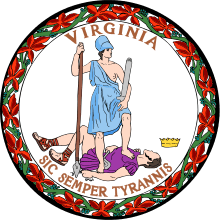Vance Wilkins
| S. Vance Wilkins, Jr. | |
|---|---|
| 53rd Speaker of the Virginia House of Delegates | |
|
In office January 12, 2000 – June 15, 2002 | |
| Preceded by | Thomas W. Moss, Jr. |
| Succeeded by | William J. Howell |
| Member of the Virginia House of Delegates from the 24th district | |
|
In office January 12, 1983 – June 15, 2002 | |
| Preceded by |
Mitchell Van Yahres James B. Murray |
| Succeeded by | Benjamin L. Cline |
| Member of the Virginia House of Delegates from the 11th district | |
|
In office January 11, 1978 – January 12, 1983 | |
| Preceded by | Donald G. Pendleton |
| Succeeded by | Albert L. Philpott |
| Personal details | |
| Born |
Shirley Vance Wilkins, Jr. August 12, 1936 Amherst, Virginia, U.S. |
| Political party | Republican |
| Alma mater | Virginia Tech (B.S.) |
| Occupation | General contractor |
| Military service | |
| Allegiance |
|
| Service/branch | United States Air Force |
| Years of service | 1958–1960 |
Shirley Vance Wilkins, Jr. (born August 12, 1936, in Amherst County, Virginia) is a retired American politician of the Republican Party. He was a member of the Virginia House of Delegates from 1978-2002. In 2000 he became the first non-Democratic Speaker since the Readjuster Party controlled the House in the early 1880s.
Wilkins was considered the driving force in the expansion of Republican House membership in the 1980s and 1990s, especially after he became minority leader in 1992. In his first term as Speaker, he oversaw the redistricting of the House after the 2000 census which led to an increase in the Republican majority from 52-47 (1 independent) to 64-34 (2 independents) after the November 2001 election.
Scandal
Republican House Speaker Wilkins was forced to resign his position following revelations that he’d paid $100,000 in hush money to a woman who had accused him of sexual harassment.[1]
